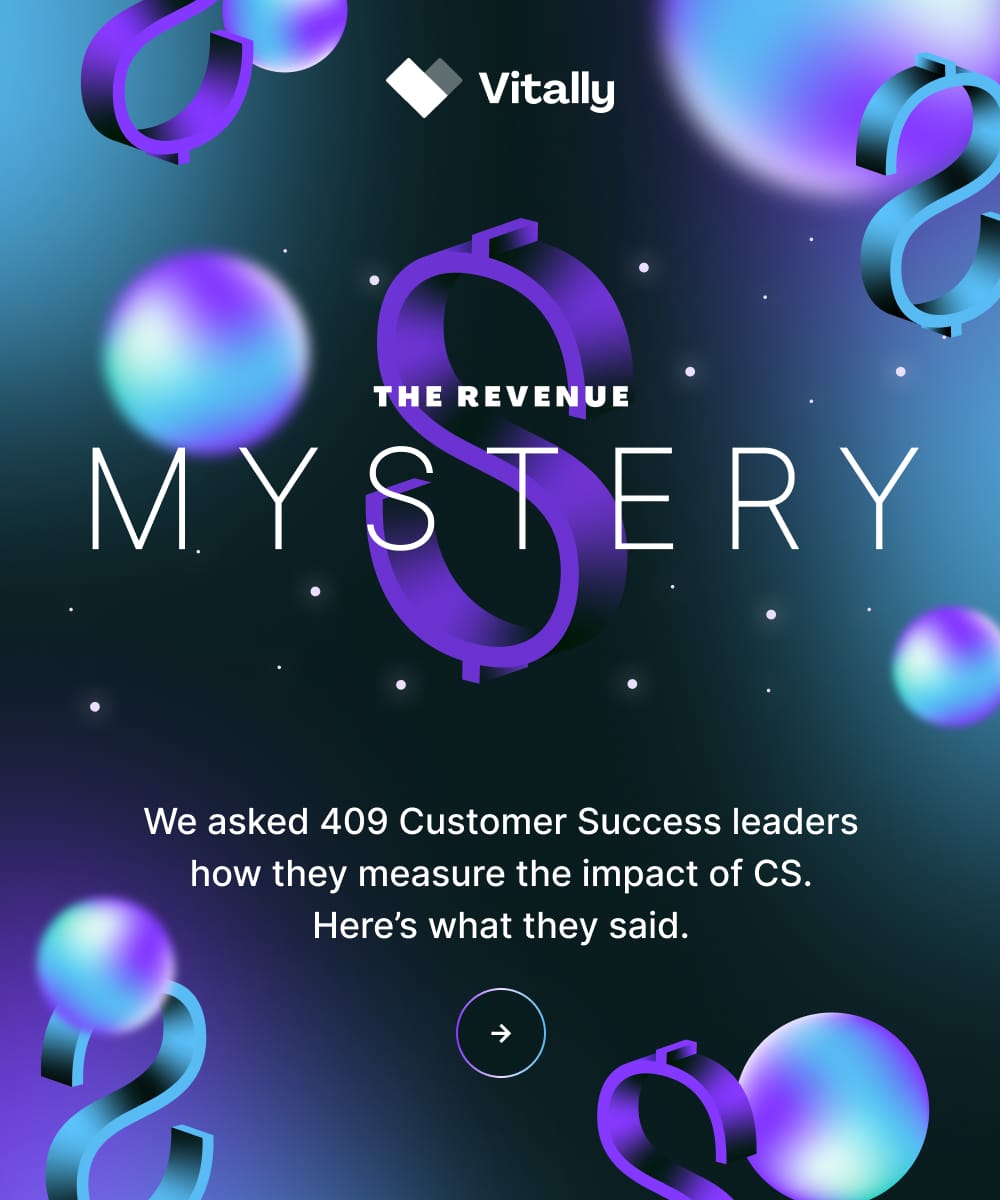
As we move through another year, it's crucial to anticipate the trends that will shape the future of Customer Success (CS).
We predict that the evolution of CS over the next decade will be driven by new technological advancements, shifts in customer expectations, and innovative strategies that enhance customer experiences. Let's dive into where we’ve been, what lies ahead, and how Vitally's latest features align with these emerging trends.
The Evolution of Customer Success: A Historical Perspective
Customer Success has not always been the robust, dynamic field it is today. In the past, businesses operated on a transactional basis, with little regard for the post-sale customer journey. The primary focus was on closing deals and once the transaction was completed, customers were often left to fend for themselves. This approach resulted in high churn rates and a lack of brand loyalty.
The Emergence of Customer Success
The shift began in the early 2000s when the SaaS (Software as a Service) industry started to gain traction. SaaS companies realized that their success depended not just on acquiring customers, but on retaining them. This realization led to the birth of the Customer Success function. Businesses began to understand that proactive customer engagement and support could significantly reduce churn and increase lifetime value.
Present-Day Customer Success: Strategies and Technologies
Today, Customer Success is a critical function in most businesses, particularly in the technology and SaaS sectors. Modern Customer Success strategies are data-driven and customer-centric. Companies leverage advanced analytics and AI to predict customer behavior and tailor their support efforts accordingly. Customer Success Managers (CSMs) now play a pivotal role in ensuring that customers achieve their desired outcomes while using a product or service.
Key Components of Modern Customer Success
- Proactive Engagement: Modern Customer Success teams anticipate issues before they arise and engage customers with personalized solutions.
- Data Analytics: By analyzing customer data, companies can identify patterns and trends that inform their Customer Success strategies.
- Customer Feedback Loops: Continuous feedback from customers is essential for improving products and services.
- Cross-Functional Collaboration: Effective Customer Success requires collaboration across various departments, including sales, marketing, and product development.
6 Customer Success Trends for the Next Decade
As we look to the future, Customer Success is poised to become even more integral to business strategy. Here are some key trends to watch:
1. How We Think About Customer Success Will Transform

According to Giftpack.ai Global Customer Success Manager David Barnes, Customer Success professionals will need to “shed their extra responsibilities and pour more time and attention into being a consultant for the accounts that they manage.” Instead of merely focusing on short-term goals and immediate needs, Customer Success will increasingly emphasize strategic partnerships that drive long-term value for both the customer and the company.
Over the next few years, the Customer Success function will rely heavily on:
- Strategic Partnerships: Customer Success teams will work closely with customers to understand their long-term business objectives and align their services and products accordingly. This approach fosters deeper relationships and positions the company as a vital partner in the customer’s growth journey.
- Value Realization: Moving beyond the initial onboarding and training, Customer Success will focus on ensuring customers realize the full value of their investments. This involves continuous engagement, regular check-ins, and tailored support to help customers achieve their desired outcomes.
- Customized Success Plans: Each customer’s journey is unique, and future Customer Success strategies will include highly customized success plans. These plans will outline specific goals, milestones, and metrics tailored to the customer’s individual needs and business environment.
- Holistic Customer Health Monitoring: Advanced analytics and AI will play a crucial role in monitoring the overall health of customer accounts. By integrating various data points, companies can gain a comprehensive view of customer satisfaction, product usage, and potential areas of improvement.
Gaining visibility into this information, such as with Vitally’s Visibility tools, is something actionable you can do now to set up your team for future health monitoring success.
2. AI Will Transform Support Systems

AI will not replace us; instead, it will enhance our work and natural intelligence.
AI is already becoming pervasive across the tech industry, revolutionizing how Customer Success teams operate. As our industry continues to transform alongside technology, AI undoubtedly represents the future of Customer Success.
Currently, chatbots leverage AI to assist users, but many are often redirected to help center resources or how-to articles instead of receiving real-time solutions. Imagine AI providing real-time, learned solutions that could transform the user experience by addressing issues immediately rather than redirecting users to pre-existing resources. For example, Vitally’s AI-driven customer insights (coming in 2025) help identify customer pain points and offer real-time solutions, ensuring a more responsive and efficient support system.
Even with a robust knowledge base or education center, Customer Success teams will need to find more creative ways to enhance user experiences in order to remain competitive ten years down the road.
AI is the best method we’ll have for accomplishing this. How do we know? Many leading companies are already leveraging it.
For example, Google's Talk to Books allows users to search for book content by entering a sentence, question, problem, or theme. This concept could be applied to an education center, enabling users to search by a sentence describing their confusion about the product, helping them find what they need quickly.
This is exactly how Vitally’s Enhanced Help Center Search functionality allows users to find resources more intuitively and quickly through key phrases or even simply asking a question in the search bar.
For further reading:
How Should Customer Success Teams Use AI Tools?
How to Bridge AI and Automation for CS Experiences Your Customers Won't Hate
3. Personalized Customer Experiences Will Be Driven by Data

In the digital age, data analytics has become an indispensable tool for Customer Success teams. By leveraging data, companies can gain insights into customer behavior, preferences, and potential issues. Vitally's Calculated Traits feature allows Customer Success teams to track and analyze customer data dynamically. This capability helps in identifying trends and making informed decisions to enhance customer experiences.
Data analytics can also aid in personalizing customer interactions. By understanding individual customer journeys, CS teams can tailor their approach to meet specific needs and preferences. This level of personalization is crucial for building strong, long-lasting relationships with customers.
Moreover, data-driven insights can help in identifying at-risk customers and devising strategies to prevent churn. By monitoring key metrics such as usage patterns and satisfaction scores, CS teams can proactively address issues and improve retention rates.
4. Continuous Learning and Development Will Become a Requirement

The field of Customer Success is constantly evolving, and staying ahead requires continuous learning and development. Vitally is committed to providing resources and tools to help CS professionals enhance their skills and stay updated with industry trends.
Vitally's Success Network offers a wealth of resources, including articles, webinars, and training materials, to support the professional growth of Customer Success teams. By fostering a culture of continuous learning and differentiation, companies can ensure that their teams are well-equipped to handle the challenges of the future.
Investing in the development of CS teams not only improves their performance but also boosts employee satisfaction and retention. When team members feel valued and supported in their professional growth, they are more likely to be motivated and committed to their roles.
5. Embracing Process Innovation Will Be Mission Critical

Innovation is at the heart of Customer Success, driving the development of new tools and strategies to improve customer experiences. Vitally is at the forefront of this innovation, continuously introducing features that help CS teams design Customer Success processes that make them far more efficient.
For instance, Vitally's Doc Automation feature streamlines the creation and assignment of collaborative documents, enhancing team productivity and ensuring consistency in communication. This tool is particularly useful for managing complex projects and maintaining clear and organized records of customer interactions.
Additionally, Vitally's HubSpot Integration with hierarchy support simplifies the integration of hierarchical levels from HubSpot into Vitally. This feature ensures that all relevant data is synchronized and accessible, facilitating better coordination between sales and Customer Success teams.
By embracing innovative processes and leveraging advanced tools, Customer Success teams can deliver exceptional value to their customers, driving growth and fostering loyalty.
6. Generative AI Will Transform Onboarding Processes

In our recent virtual panel on “Mastering Customer Success: Lessons From Industry Trailblazers,” accomplished women CS leaders came together to discuss many topics. Chief among them was the use of generative AI in onboarding experiences.
And according to our experts, it has the potential to completely transform the way companies interact with and support their customers, leading to a more personalized and efficient Customer Success process.
By leveraging generative AI, companies can create highly tailored onboarding experiences that adapt to individual customer needs and preferences in real-time. This technology can generate personalized content, tutorials, and support materials, ensuring that each customer receives the specific information and guidance they need.
Vitally’s innovative tools, such as the First Call Success Generator, exemplify how AI can enhance the onboarding process by creating customized agendas and solutions for new clients, setting the stage for a successful long-term relationship.
The integration of generative AI can significantly reduce the time and resources required for onboarding, allowing Customer Success teams to focus on building stronger, more meaningful connections with their customers.

Final Thoughts
The future of Customer Success is bright, with many opportunities for growth and innovation. As communication styles, onboarding processes, and AI tools continue to evolve, embracing these changes is crucial for professional and personal growth. While some trends mentioned are not entirely new, they continue to evolve, creating room for new trends to address industry challenges.
If you're eager to stay ahead of the curve and drive exceptional results for your customers, explore more insights and resources on our blog and resources library. Join us in shaping the future of Customer Success.










